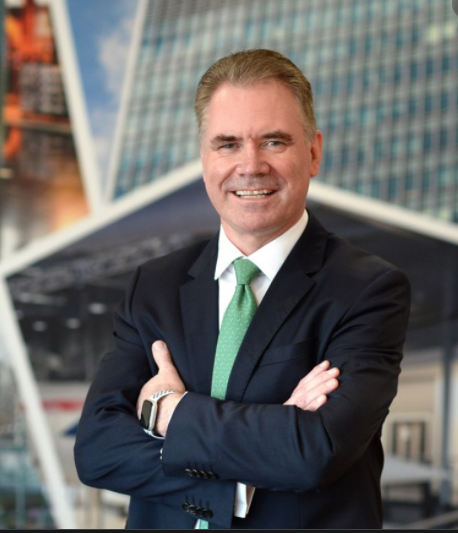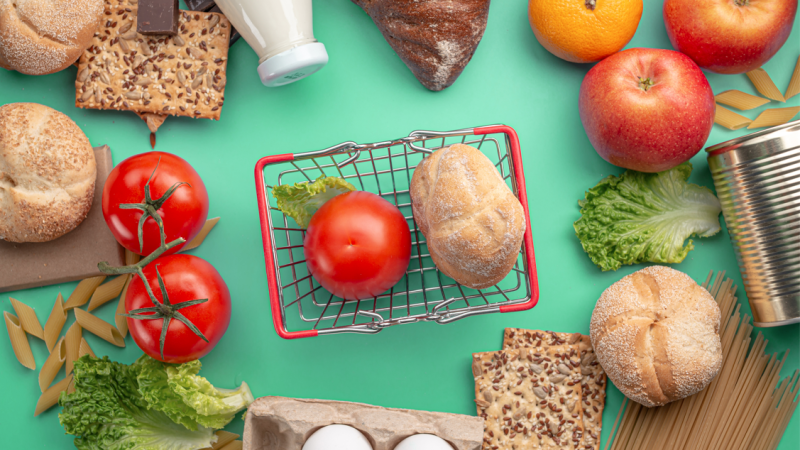Aramark’s route map to net zero: Northern Europe CEO Frank Gleeson

As services giant Aramark commits to being net zero by 2050, Northern Europe CEO Frank Gleeson tells Ireland’s Forecourt & Convenience Retailer how the company plans to make it happen.
With COP26 in Glasgow having put the climate change crisis front and centre of everyone’s agenda, food services giant Aramark Northern Europe has committed to being net zero by 2050, making it the first region in the company’s global operations to set a reduction glide path.
Combined, the Northern Europe region is set to meet the targets set by current legislation for all relevant jurisdictions and Aramark Northern Europe has also committed to align with the global business’ commitment to set science-based targets following the Science Based Target Initiative’s new Net-Zero Standard over the next 24 months.
Aramark Northern Europe CEO Frank Gleeson said: “Aramark Northern Europe, including our UK, Ireland and Global offshore business, has worked diligently, to understand, interrogate, and improve upon the impact of our operations; all the while ensuring that we also improve our services for clients and customers alike.”
“The urgency of the climate crisis has renewed our focus on innovation, collaboration, and competition on a scale that we have never seen before.
“There is no sustainability practice or effort too small, nor too insignificant, once it is firmly rooted in the intent to do right. With that in mind, everyone in our organisation is committed to playing their part in ensuring we meet our Net Zero Roadmap and Commitments for the region.”
To deliver its ambitious global target, the company will transform carbon-intensive areas of operations, as well as working with suppliers to change contributing factors within the supply chain.
Key commitments are built around:
Transport:
Replacing the existing fleet of diesel and petrol owned and leased vehicles to electric vehicles (EV) as soon as is practical and training drivers how to drive more efficiently to reduce emissions, which will be monitored and captured by telematics.
And Frank Gleeson told the Yearbook: “As it stands – the forecourt environment in Ireland has made significant strides in the provision of charging points at all levels, but wider national EV infrastructure is not quite where it needs to be to transition our fleet as aggressively as other companies.
“However, we have a fantastic Fleet team who are consistently reviewing improvements and advancements in battery range and manufacturer offers so that we can ensure to bring more EV with every stage of fleet renewal.”
Energy Efficiency:
All electricity contracts will be procured from renewable or low carbon sources with green champions at each gathering monthly energy performance data to provide feedback that will be are incorporated into capex decisions.
Aramark’s Business Excellence, Facilities and Property Management Teams will also collaborate and integrate service lines, where appropriate, to provide multi-faceted reduction solutions across our workplace footprint.
Goods and services:
In Northern Europe, Aramark has already been moving towards a higher percentage of plant-based meals along with the development of a science-based climate friendly menu proposition. With this, it is changing recipes, increasing the mix of plant-based, and environmentally sustainable dishes based on 50 key ingredients.
Source locally:
CEO Frank Gleeson told the Yearbook Aramark prides itself on its long-standing commitment to identify, partner with, and support local producers, relationships that will only be enhanced by the latest commitments with a preference for locally sourced in instances where carbon reduction can be achieved.
“Aramark has long made a deliberate effort to source local produce throughout our supply chain,” he explained.
“Our decarbonisation plans are simply an affirmation of this promise towards more of the high quality, ethically sourced produce that our clients and customers expect. For example, we source more than €60 million in local goods and services annually, including serving 100% fresh Irish beef and lamb in Ireland too.”
Minimising waste and maximise recycling:
Aramark will trial software that tracks and manages food wastage, indicating possible changes to menus and portion sizes. In addition, staff training programmes will minimise waste and maximise recycling with food waste sent to anaerobic digestion plants.
Asked if any charitable tie-ins might benefit from this and whether Irish companies who share Aramark’s ambitions would be viewed more favourably, Frank Gleeson said: “It’s exciting to see so much innovation and entrepreneurship in this space in Ireland.
“We are very proud of our partnership with Good Grub, for example, which has created a swell of awareness for the solutions that food donations can bring those in needs.
“More broadly, we are setting best practice expectations for every stage of the food and packaging life-cycles, and we plan to have a positive impact in this space as our efforts and programmes expand.”
Travel:
Aramark is set to encourage its staff to embrace technology to limit travel and where travel is required, it will prioritise carbon reducing travel modes, such as rail over air and cars.
Frank Gleeson conceded that the pandemic had taught Aramark some valuable lessons when it came to communicating in person.
He told the Yearbook: “As a hospitality business with thousands of frontline, customer-facing employees, we are never going to undervalue face-to-face interaction.
“However, the pandemic has shown that remote collaboration (particularly on a global scale) is now an everyday part of our operational environment. This means even more innovative solutions, greater flexibility, and stronger products for our clients and customers.
“On carbon footprint specifically, we are currently developing an employee travel policy that will ensure we avoid unnecessary meetings and reduce our business travel footprint overall – particularly when it comes to air travel.”
Engage Employees:
Aramark aims to encourage its employees to join its sustainable journey by putting in place and extending initiatives such as cycle to work schemes, encouraging carpool arrangements, providing information on public transport alternatives, installing EV charge points and paying favourable mileage reclaim rates to EV vehicles.
And Aramark CEO Frank Gleeson told the Yearbook the firm aimed to sup-port the process for drivers switching from internal combustion engine (ICE) vehicles to EV.
“Our Fleet and Energy teams are collaborating on a project that would enable our drivers to use one charging card for home, public and HQ charging thus streamlining the process and minimising touch points for drivers,” he explained.
“Current government grants for home charger installation have recently been made available to fleet drivers, helping incentivise the switch to EV. Government incentives like this are critical to support the move to EV particularly as we have not yet seen price parity with ICE and EV.”
Aramark insists its Net Zero 2050 Commitment is just the beginning for Aramark Northern Europe, with the business acknowledging that there is still more to do as part of a wide-ranging effort to have a positive impact on people and the planet – the essence of the company’s Be Well. Do Well. sustainability plan.
This Net Zero milestone will also combine with ESG efforts for Northern Europe, ranging from mandatory Sustainability e-learning for all 15,000 employees in the region, along with operational training and tools on plastic packaging, waste management, energy saving, and food waste prevention.
The big message: “There’s much more to come.”
For the full article in the IFCR yearbook, click HERE.







